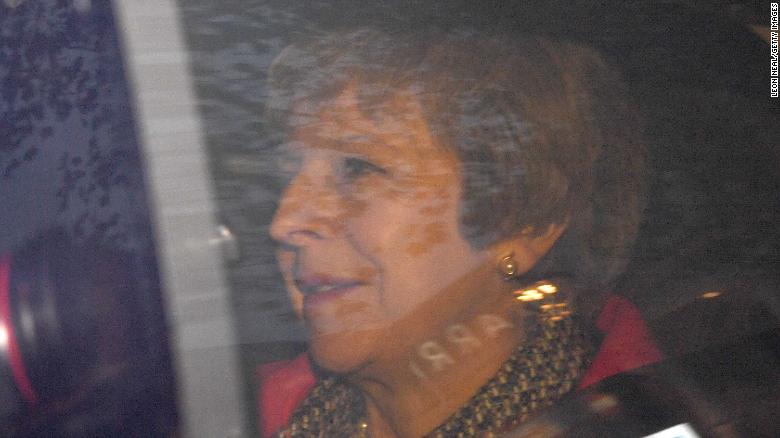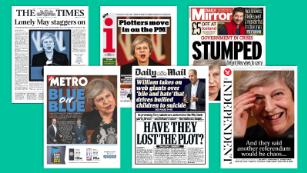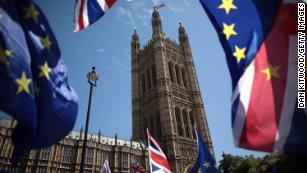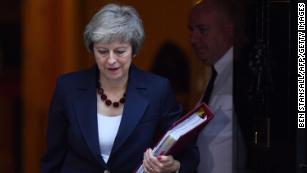Embattled May sticks by Brexit plan amid growing rebellion
UK Prime Minister Theresa May maintained a defiant stance as she took to the airwaves Friday morning to attempt to sell her Brexit plan to the electorate, following a bruising day of political turmoil and open rebellion from within her own party.
The interview and listener call-in with radio station LBC followed a wave of resignations Thursday, with seven members of her government quitting over the draft Brexit deal, and vocal demands for her to step down as leader.
After a day of chaos, May insisted in a statement at 10 Downing Street that the deal, which has attracted intense criticism from all sides, was in the national interest, and made it clear that she had no intention of stepping aside.
Speaking on LBC, she again defended the agreement struck with the European Union this week following months of tough negotiations.
UK media portray a defiant Theresa May on the brink
Asked why she believed she should stay on rather than standing aside to let a Brexiteer lead, she replied: "You're absolutely right that for a lot of people who voted Leave, what they wanted to do was make sure that decisions on things like who can come into this country would be taken by us here in the UK, and not by Brussels, and that's exactly what the deal I've negotiated delivers."
May did not confirm or deny whether the Cabinet would get a free vote on the final deal when it's presented to Parliament. "There is cabinet collective responsibly in this country... you're asking me to look at issues around the vote before we've even finalized issues with the European Union," she said.
Ordinarily, ministers must vote according to government policy, or else resign or be fired. But if the party leadership grants a free vote, they would be able to vote according with their own views, even if that means voting against the government.
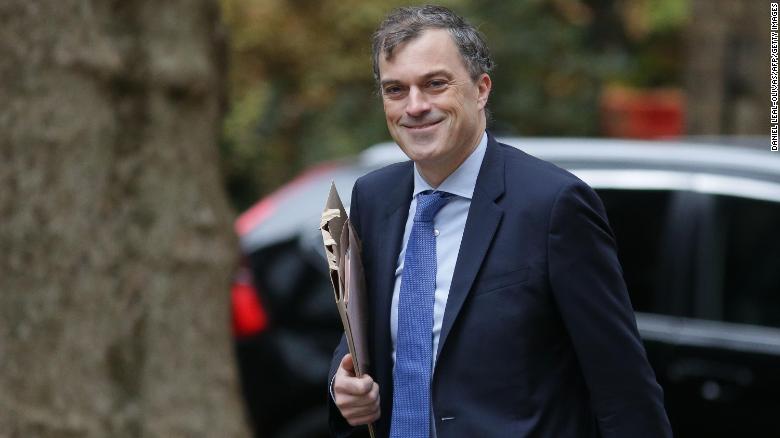
Conservative Party chief whip Julian Smith arrives at Downing Street on Friday.
Conservative Party chief whip Julian Smith -- whose role is to maintain party discipline -- was seen arriving at Downing Street on Friday morning as May seeks to rally support within Conservative ranks.
EU officials have called a European Council meeting for November 25 in Brussels to finalize and formalize the agreement.
The UK is staring down the barrel of a recession if Brexit is botched
May's Brexit secretary, Dominic Raab, was the most significant of Thursday's bombshell resignations. He lasted only four months in the job, having replaced another Brexiteer, David Davis, who quit in July over May's intended Brexit course.
The Prime Minister has yet to name Raab's successor in the role. But questioned on LBC, she did not deny reports that she had offered the post to Environment Secretary Michael Gove, another high-profile Brexit supporter, only to have him turn it down.
"I don't talk about things to do with the Cabinet reshuffle," she said, adding that she would be appointing a new secretary "over the next day or so." Asked to wager on who would take up the position, she replied: "I don't bet on anything to do with politics."
According to the BBC, Gove is currently considering his position, and may add his name to the list of resignees.
Precarious position
May's own political future remained precarious Friday despite her efforts to present a calm front.
Conservative MPs lined up Thursday to declare that they had submitted letters to party officials demanding a vote of confidence in May's leadership.
Earlier, May had endured a grueling appearance in the House of Commons, facing hostile questioning from both remainers and leavers.
Opposition Labour Party leader Jeremy Corbyn slammed what he called a "botched" and "half-baked" deal, saying it "represents a huge and damaging failure" on the part of a government "in chaos."
Nigel Dodds, deputy leader of Northern Ireland's Democratic Unionist Party -- which May relies on to prop up her minority government -- was also damning in his assessment of the deal, saying the Prime Minister "clearly doesn't listen."
Rees-Mogg rallies Brexiters
A key sticking point is the issue of the Irish border. The European Union wants the UK to agree a "backstop" or fallback position that would ensure an open border between Northern Ireland, which will be outside the EU, and the Republic of Ireland, which will remain an EU member state.
Ignore the noise, Theresa May could be the only one who gets Brexit reality
May's plan, for which she secured Cabinet backing on Wednesday, means that the UK would abide by European customs rules, at least temporarily, until a permanent solution can be found. Staying within the customs union is anathema to the Brexiteers.
On Thursday, Jacob Rees-Mogg, one of her most ardent critics and a steadfast Brexiteer, announced publicly that he was submitting a letter of no-confidence in May -- essentially an open call for her own party to unseat her. A chorus of other Brexiteers have joined Rees-Mogg in calling for a vote of no-confidence.
If 48 such letters are sent to Graham Brady, the party official who represents the interests of Conservative MPs, a vote of confidence would be triggered.
In order to force May out, her opponents would need 159 Conservative MPs from a total of 316 to vote against her in a simple majority vote. A leadership contest would then follow in which she could not stand.
News Courtesy: www.cnn.com

